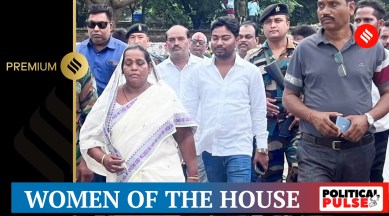In third-ranked Jharkhand, what lies behind the women MLA numbers: ‘wives, daughters’
Of the 12 women MLAs after bypolls, as many as 11 have political links, five entered politics after death of their husbands

At 12.3% OF its total MLAs following the last Assembly elections, Jharkhand ranks third among states with the highest representation for women. However, with a rider: most of the women MLAs come from political families, following in the footsteps of relatives.
A comparative analysis also shows only a marginal increase in the number of women contestants between the 2014 (111 contestants) and 2019 (127) Assembly elections. In 2014, of the 111 women who contested, 8 had won, while 93 lost their deposits. In 2019, there was a 14% increase in the number of women contestants, with the winners going up to 10.
monthly limit of free stories.
with an Express account.
Following two bypolls this year, first won by NDA constituent All Jharkhand Student Union (AJSU)’s Sunita Chaudhary, and the second by INDIA bloc JMM’s Bebi Devi, the Jharkhand Assembly now has 12 women MLAs. Of these, the ruling INDIA bloc has 8, and the NDA four.
The 12 include: Joba Manjhi, Sita Murmu, Sabita Mahato and Bebi Devi of the ruling JMM; Purnima Singh, Amba Prasad, Deepika Pandey Singh and Shilpi Tirkey of JMM ally Congress; Pushpa Devi, Aparna Sengupta and Neera Yadav of the BJP; and Chaudhary of the AJSU.
Of the 12, as many as 11 have political links, eight are first-time legislators, while five joined politics after their husbands died.
Across parties, leaders say that while a number of women work at the grass-root level, when it comes to the Assembly, the primary consideration is winnability, which comes down to “some political support or lineage”.
In the 2019 Assembly polls, the JMM fielded 6 women across the 43 seats it contested, the Congress also had 6 women contestants among its 31 candidates, while the BJP fought 79 seats and fielded 7 women.
Among the first-timer MLAs in the Jharkhand Assembly is Pushpa Devi from Chattarpur, who won on the BJP ticket in 2019. Her husband Manoj Bhuyian is a veteran RJD leader, who joined the BJP along with Pushpa before the 2019 elections.
Shilpi Neha Tirkey was fielded by the Congress from Mandar in a by-election in June 2022, necessitated by the conviction of her father Bandhu in a graft case.
The other six first-time MLAs are: Sabita Mahato, the JMM MLA from Ichagarh and wife of the late Sudhir Mahato, who was a Deputy CM in the Madhu Koda government, and two-time JMM MLA; Purnima Niraj Singh, the Congress MLA from Jharia and the wife of the late Congress leader Neeraj Singh, who was shot in 2017; Amba Prasad, a Congress MLA from Barkagaon, whose parents were both legislators; Bebi Devi, who won a recent bypoll from Dumri, necessitated by the death of her husband Jagarnath Mahato due to Covid-19 infection; Sunita Chaudhary, the AJSU MLA from Ramgarh, whose husband Chandra Prakash Choudhary was earlier a two-time MLA from the seat and is now an MP from Giridih; and Dipika Pandey Singh, the Congress MLA from Mahagama and the daughter-in-law of four-time MLA Awadh Bihari Singh.
Jobha Manjhi, in contrast, is a veteran legislator, now into her fifth term as MLA from Manoharpur. Her one Assembly win was when Jharkhand was part of Bihar. She got into politics after her husband Devendra Manjhi was killed.
Aparna Sengupta is a two-time MLA from Nirsa, who also followed her late husband into politics. Her husband, All India Forward Bloc’s Sushanto Sengupta, was killed in 2012. She joined the BJP in 2015.
Neera Yadav from the BJP is a second-time MLA from Koderma. The family is said to be politically affiliated, though none has held an office.
Sita Soren is a three-time MLA and the daughter-in-law of JMM co-founder Shibu Soren.
Political observers say tickets to family members reduces the risk of elections, with parties riding on name recognition. And that while Jharkhand is among the states that increased the women quota in panchayati raj institutions to 50%, it is mostly male relatives of elected women panchayat officials who run the show.
On the factors holding back women, and mostly women with political links getting tickets, Congress Maghama MLA Dipika Pandey Singh says: “Women generally don’t get a ticket because the narratives are formed around winnability or the money factor comes into play. And we can’t lobby like the men.”
This is despite women being better legislators, Singh says. “They do much better whether inside the Assembly or outside. They are much more organised.”
This is why the Congress backs reservation for women, and a quota for OBCs within it, Singh adds. “After the Bihar caste survey, the situation is pretty clear. It’s more or less the same in Jharkhand. If not 63% for OBCs, here the count will not be less than 55-56%.”